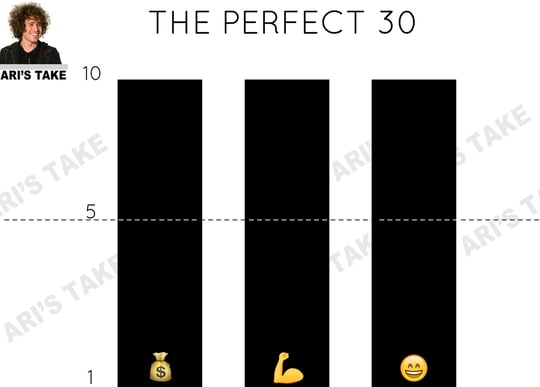 Ari Herstand. (Photo by Gadi Rouache)
Ari Herstand. (Photo by Gadi Rouache)
This is a guest post by Ari Herstand, author of How to Make It in the New Music Business and originally appeared on Ari’s Take.
Remember, nothing in the music industry is black and white. Not streaming. Not pirating music. Not playing gigs for free. Is playing for free ever okay? Short answer is yes. Should bands take free gigs? Short answer is maybe.
But nothing in the music industry can accurately be answered with a short answer. Use this guide to help you decide if the gig is right for you.
For paying gigs
Don't take a gig unless it meets The Perfect 30 Test:
- Payment = 10
- Career building = 10
- Enjoyment = 10
 Image courtesy of the author
Image courtesy of the author
You don't want to play any shows for less than a total of 15 on the Perfect 30 scale. If the payment is incredible (10), but there will be very little career building potential (3) or enjoyment (2), that equals 15.
If there is decent payment (5) and will bring great enjoyment (9) but little career building potential (1), that also equals a 15.
Take these shows. The shows you shouldn't take are the ones for little to no money (1), very little career building potential (3), and very little enjoyment (3), which equals 7 total. Pass!
[8 Way to Get the Best Deal for the Gig]
For free gigs
Of course, the decision to take a free gig is up to you, but as someone who has played countless free gigs, I can tell you the ones that I'd do again for free and the ones I definitely would not. There are a few instances when free gigs are no-brainers:
For charity or a worthy cause
If you believe in the cause or the organization, then absolutely offer your services free of charge. Your "normal performance fee" can sometimes be a tax-deductible donation for certain organizations. Always ask the org.
You can also always ask the organizers if they have a "stipend" for you. Can't hurt to ask. Oftentimes, they will have a bit of a budget. So, if your normal performance rate is $500, they may be able to give you a stipend of $100 (and you may be able to write off $400 as a tax-deductible donation).
As a favor or trade
Sometimes your friends are throwing an event and will most likely lose money on it. It's always cool to play for your buddies' and ladies' parties or events for no charge, because they're your people. Maybe they're a graphic design artist or a videographer or a doctor. Maybe you need a logo, a music video, or a check up. Bartering is sometimes even better than cash.
Sitting in
Sitting in is a time honored tradition in the singer/songwriter and jam communities. But every band should do it at some point. It's when you call up a friend to sing harmonies or rip a solo. Or even just join you on stage with a tambourine.
It's an honor and an endorsement of that artist. Of course, the host band should announce the artist's name who sat in and give their project a plug. Fans love to see this kind of community building.
Some of my favorite shows are ones where the main act brought out special guests. These guests aren't paid. They're doing it because they want to. It's usually a lot of fun to step outside your performance norm, and it can also help promote upcoming shows.
For practice
If you're new to the performance thing or your band just formed, you need practice performing. Young bands should take any and every performance opportunity. Most often, these will be free shows.
In LA (and unfortunately it's starting to happen more frequently around the country), "promoters" will get bands to pay to play in sneaky ways like requiring them to sell a certain number of tickets for their set. And if they don't meet their quota, they have to make up the difference.
Or sometimes the "promoter" keeps all income from the first 50 tickets sold and then the band keeps the rest, or something absurd like that. At $10 a pop, that's $500 off the top to the promoter. Five bands on the bill, $2,500 to the promoter before any band earns $1!
Don't take the bait. Find low-pressure performance environments to hone your chops where they don't charge you to play (ahh!), but you may not get paid either. That's okay. You don't deserve to yet.
[Should You Pay to Play? Here Are the Worst to Best Deals in the World]
Strong merch/tip potential
Okay, this is slippery because bookers will promise you good merch/tip potential and rarely does it work out to be so. However, sometimes it really can be.
I performed a small side stage at "The World's Largest Music Festival" Summerfest in Milwaukee two to three times a day for four years and I averaged about $300 a set in merch and tips. Yeah, the fest didn't pay me anything to play this stage, but I made up for it in the regularity of the performance slots and the merch/tip income.
[How to Make the Most Amount of Tips at the Gig]
We can debate how ethical this was for the festival to do, but regardless, I walked away from the 11-day festival $8,000 richer every year. Not bad.
[How to Double Your (Merch) Income... No Really]
For enjoyment
Like The Perfect 30 test, sometimes you know you're going to just have a darn good time. And isn't that what life is all about?
As a creative outlet
This argument is used by hobbyists. There are the school teachers, bankers, construction workers, and others with full-time jobs that have nothing to do with music, and these hard-working dayjobbers are just looking for a creative outlet. A way to express themselves artistically, openly, and outwardly. In front of an audience.
Unfortunately, these hobbyist musicians accepting the free gigs undercuts the professionals. Because of this, the pros have a much more difficult time demanding a fair price for their performances.
I don't encourage the "creative outlet" practice, but it happens, and there are many hobbyists who fall into this category.
Dear all hobbyists, please ask for a fair price for your performance. Because if you don't, you're hurting those who are trying to make their livings with their art. Love, professional artists everywhere.
Next up: 3 Times It's Worth It to Take a Performance Opportunity That Doesn't Pay
Ari Herstand is the author of How to Make It in the New Music Business, a Los Angeles-based singer/songwriter, and the creator of the music-biz advice blog, Ari’s Take. Follow him on Twitter: @aristake.


